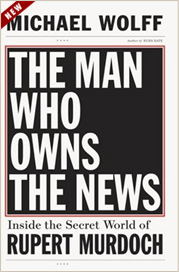 The history of business is littered with the bones of men and companies that ignored progress.
The history of business is littered with the bones of men and companies that ignored progress.
Usually this ignorance appears after the founder's death. The fate of Polaroid was not sealed until years after the death of Edwin Land. Toyota did not overtake GM until decades after Alfred P. Sloan was a-moldering in his grave.
But sometimes, in a few tragic cases, the fall comes in the lifetime of the founder. This is increasingly common in the era of Moore's Law. Thus we had the tragedies of men such as Ken Olsen, An Wang and Seymour Cray. New solutions change the game, the Great Man refuses to play, and he is crushed on the wheels of history.
This had not happened in media in quite a long time. True, the Linotype crushed many small papers under the heel of Hearst and Pulitzer. But radio did not kill the newspaper, and many TV licenses were given directly to radio companies, even newspaper magnates.
Thus the industry was completely unprepared for the Internet. I well remember an event at the Atlanta Press Club in 1995, where Cox Enterprises chairman James Cox Kennedy confidently predicted the Internet would be an enormous boon to newspapers, enabling him to "repurpose" his content and get paid multiple times for the same story. I just shook my head. The man was clueless, and history has shown that to be true.
But Kennedy was a genius next to Rupert Murdoch. Murdoch, feared as perhaps no press baron ever just a few years ago, now stands as the Stupidest Man in the World.
The reason is on the cover of Michael Wolff's 2008 book about Murdoch. "The Man Who Owns the News."

Ironically, Murdoch himself has created some of these ways. Blogging is a lot like talk radio, and his Fox News is the biggest talk radio station ever. Everyone knows how to profit from a large aggregated audience.
But Murdoch is under the insane impression that gathering the news gives someone a proprietary interest in it. Anyone and everyone can be a journalist today, and we are. The abortive (and still ongoing) Iran Revolution was tweeted and blogged — the "real" journalists were locked into their hotels or exiled. If a tree falls in the forest and no journalist hears it it still makes a sound — all you need is someone standing nearby with a cellphone.
Thus, when Murdoch promises to erect pay walls around his content, and even threatens to keep "his" content from being indexed by the Google — we all laugh. It's only content that can't be found which does not exist, and he's "threatening" to put his stuff into that category.
Murdoch's cluelessness has, of course, been on display since the Web was spun. His promises to control the business through, say, the purchase of MySpace have all failed because word-of-mouse saw his audience disappear due to his own reputation.
Murdoch could still make money online, of course. He can do it through mobile services, which aren't really the Internet at all. And he could do it by concentrating on his core audience, by milking the tea party for every dime he can squeeze from it.
Of course, the tea partiers might run off to Newsmax or The Examiner, but enough might stay and pay his price that he can get a few eggs from the golden goose while she is being strangled. That's the problem with the Wingnut Welfare Class — you have to keep feeding them. They're not a cash cow, they're a cash sink.
And so Murdoch slowly circles the drain, in a sinking that has nothing to do with politics but all to do with changing technology. I'm sure Keith Olbermann is enjoying doing his pirate voice while Murdoch's ship slowly sinks, but this has nothing to do with him.
He's soon going to be working for Comcast, anyway.











How deliciously ironic…Murdoch silences himself.
How deliciously ironic…Murdoch silences himself.
When I read the title I thought you had written an autobiographical blog entry.
When I read the title I thought you had written an autobiographical blog entry.
What Murdoch really wants Google to do is pay him for the privilege of making money from a derivative of their product! You know, like book reviewers always pay novelists. Last I checked, Fox/WSJ, AP, Reuters, WashPost, NYT, et al., have at least one plagiarist on staff and no progressive voices. Are David Broder, Peggy Noonan, and Maureen Dowd really worth paying for? Are the often inadequate to inaccurate (see Fort Hood) “news” reports worth paying for? Do the tea baggers ever read past Drudge’s headlines?
Point is, nothing interesting or informative for me comes from those sources. They’re like listening to NFL sports broadcasters — I can mute the TV and tell you everything they’re saying, most of it cliche.
What Murdoch really wants Google to do is pay him for the privilege of making money from a derivative of their product! You know, like book reviewers always pay novelists. Last I checked, Fox/WSJ, AP, Reuters, WashPost, NYT, et al., have at least one plagiarist on staff and no progressive voices. Are David Broder, Peggy Noonan, and Maureen Dowd really worth paying for? Are the often inadequate to inaccurate (see Fort Hood) “news” reports worth paying for? Do the tea baggers ever read past Drudge’s headlines?
Point is, nothing interesting or informative for me comes from those sources. They’re like listening to NFL sports broadcasters — I can mute the TV and tell you everything they’re saying, most of it cliche.